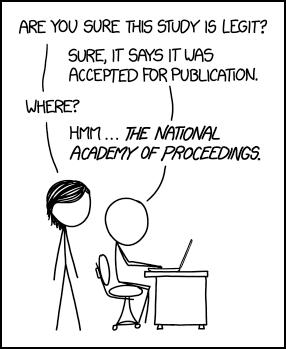Image by Fabian Reus; https://flic.kr/p/pjBcGB; CC BY 2.0
Predatory publishers: an origin
by Siti Nurleily Marliana & Joaquim Baeta
Defining the term “predatory”
Before discussing predatory publishers, we should first look at the definition and origin of the term “predatory publisher”. Merriam-Webster defines1 “predatory” as:
a: of, relating to, or practicing plunder, pillage, or rapine
b: inclined or intended to injure or exploit others for personal gain or profit
The meaning should be self-explanatory, even when used in the context of scientific publication. Beall coined the term “predatory publisher” in 2010 in reference to open access publishers “that unprofessionally abuse the author-pays publishing model for their own profit.”2
This article series uses the term “predatory” based on Beall’s definition, but only loosely, for the purposes remaining consistent with the established terminology rather than accusing any publisher or journal of misconduct. Whenever appropriate, it will also employ the term to describe any subscription-based journal that fits the criteria of a “predatory publisher” as defined by Beall.
The origin of predatory publishers

Beall came up with the concept of predatory scholarly publishing in response to the burgeoning publishing business occuring in the wake of the open access movement, which took advantage of the greater accessibility of the modern internet. The term was specifically reserved for OA publications and the OA publishing system, excluding subscription-based and hybrid journals.
The reason the OA movement raises concerns in the scholarly publishing industry is because, compared with the traditional subscription model, it simplifies the process of becoming a publisher, which consequently increases the desirability of scholarly publishing as a business model. As with any capitalistic enterprise, this can eventually lead to the emergence of new publishers with a questionable quality, or worse, unscrupulous ones who “use deception to appear legitimate, entrapping researchers into submitting their work and then charging them to publish it.”3
Unlike the subscription-based model, in the open access model, the author—not the reader—is the customer. Revenue is thus tied to the number of manuscripts accepted (or submitted in the case of the worst offenders), not the number of readers. More papers published means more revenue generated. Such a model can be easily exploited by publishers seeking to gain a quick profit while at the same time ignoring the ethical standards of publication. This is where the danger arises. According to Swoger4, “the big difference between ‘honest’ commercial publishers (whose goal is to make money) and the ‘predatory’ open access publishers on Beall's list (whose goal is also to make money) is the quality of the product they are producing.” Nevertheless, many authors have flocked to the latter, lured by promises of easy publication or motivated by pressure from their institutions to publish early and often (otherwise known as publish or perish).
Regardless of the reasons behind it, and in spite of any superficial claims of rigor and authenticity, abuse of the OA publishing model compromises the integrity of science and scientific communication. It discards journals’ long-established function as gatekeepers of scientific knowledge in favor of pumping out an ever-increasing number of papers regardless of their scientific quality, contaminating the pool of knowledge with substandard research.
References
Predatory. Merriam-Webster. [accessed 2018 Apr 9]. https://www.merriam-webster.com/dictionary/predatory.
Beall J. Medical publishing triage – chronicling predatory open access publishers. Annals of Medicine and Surgery 2013;(2)2:47–49. doi:10.1016/S2049-0801(13)70035-9.
Beall J. Predatory publishing. The Scientist Magazine. 2012 [accessed 2018 Apr 11]. https://www.the-scientist.com/?articles.view/articleNo/32426/title/Predatory-Publishing/.
Swoger B. It’s not about predators, it’s about journal quality. Scientific American Blog Network. 2013 [accessed 2018 Apr 11]. https://blogs.scientificamerican.com/information-culture/its-not-about-predators-its-about-journal-quality/.